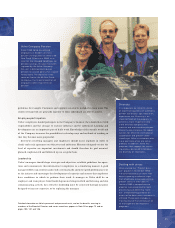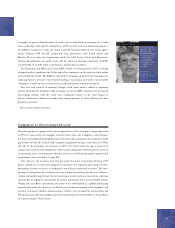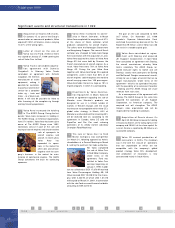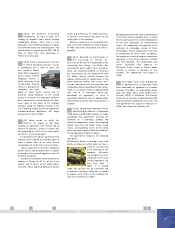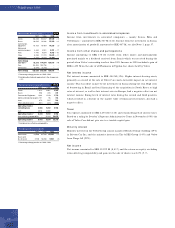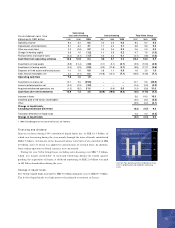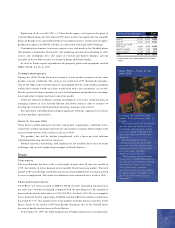Volvo 1999 Annual Report Download - page 23
Download and view the complete annual report
Please find page 23 of the 1999 Volvo annual report below. You can navigate through the pages in the report by either clicking on the pages listed below, or by using the keyword search tool below to find specific information within the annual report.
21
The cooperation with Deutz
At the end of 1998, Volvo signed a cooperation agreement with the German engine
manufacturer Deutz. In addition to the joint development of a new family of diesel
engines of 4–7 liter cylinder volume, the agreement designated Deutz as Volvo’s main
supplier of small and medium-size diesel engines, while Volvo will focus on heavy
engines within 9–16 liter cylinder volume. In conjunction with the agreement, Volvo
also acquired a 10-percent minority shareholding in Deutz to indicate its long-term
intentions and secure future cooperation.
The agreement with Deutz is progressing according to plan. Activities include Volvo
Construction Equipment’s inclusion of existing Deutz engines in part of its product
program. Volvo Penta is to begin selling products with Volvo engines – developed in
cooperation with Deutz – at mid-year 2000, while Volvo Construction Equipment will
do the same toward the end of 2000. Volvo Trucks and Volvo Buses are gradually taking
corresponding action in their programs, in conjunction with future product launches.
When the agreement with Deutz has been fully implemented, it will generate
substantial cost-savings for the Volvo Group a few years ahead. Volvo is already
realizing cost-savings by sharing development costs for the next generation of
medium-heavy engines with Deutz.
The millennium shift
The changeover to the new millennium occured without any major problems within
the Volvo Group. Like most major companies and public authorities, Volvo strength-
ened its preparedness on New Year’s Eve and during the following days. During the
New Year holidays Volvo conducted a thorough verification of computers, networks,
business applications and equipment used in production and buildings. A number of
minor defects were found and corrected immediately, but no defects resulted in
production problems in any of Volvo’s units. Nor did the changeover to the new
millennium affect Volvo’s products or deliveries from Group suppliers.
The costs of the work for preparations and corrective measures, from the beginning
of 1997 to mid-2000, are estimated to be within the framework of the amount
announced earlier, approximately SEK 550 M. Analyses show that if Volvo had failed
to undertake the preparedness program the consequence would have been halt in
production, in development units and in marketing; thus it was clearly essential to
implement the program.
Jakub Gajecc
Assembly line
worker, Volvo
Wroclaw, Poland
Volvo’s brand
stands for prod-
ucts of the highest
quality, but also
production of the
highest class. In
our work, that
means clean plants,
with everything in
its place and easy
access to the tools
we need for the job.
My view of Volvo


